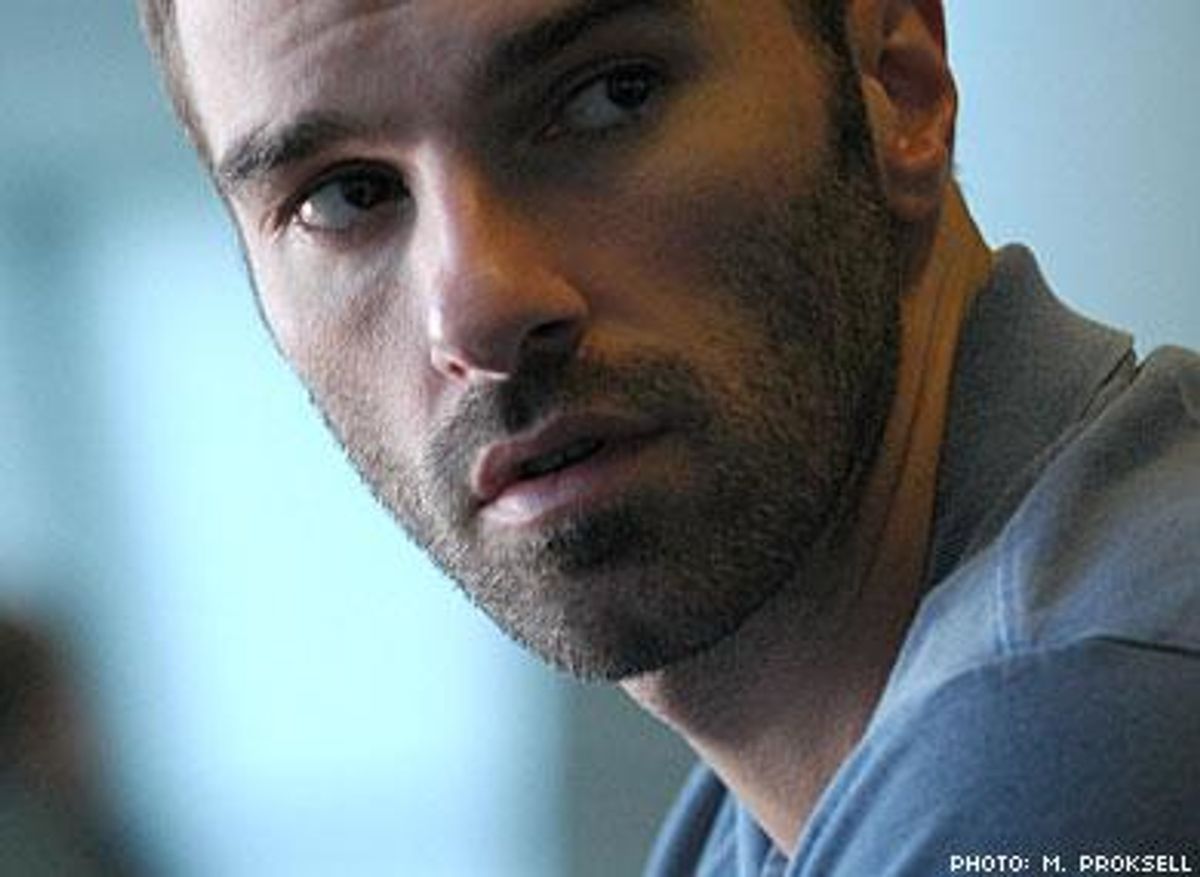At first,
Malaysian-born writer-director Yen Tan would seem to have
little in common with his new film, Ciao, the
story of grieving Texan Jeff (Adam Neal Smith), who learns
that his late friend had an e-mail relationship with
hunky Italian Andrea (script co-writer Alessandro
Calza). Still, Tan says the movie was autobiographical
in some surprising ways.
Advocate.com:Tell us a little bit about how the movie was
conceived. How did one of the leads, Alessandro Calza,
end up writing this with you?Yen Tan: He saw my first film (Happy Birthday)
in Italy, so he wrote me an e-mail in 2003 and we just
started e-mailing from there. We had a really good
sort of platonic correspondence between us -- we talked a
lot about the arts and that kind of stuff and
communicated on that basis. This film came along and I
always thought he was kind of an interesting character
from what I knew of him at that point, because this was
before I had actually met him in person. Also, at this
point, he was telling me stories about people he met
online, long-distance relationships and so on. So I
think the combination of those things inspired me to create
that sort of character and also use some of his
experiences in the film.
The other main character in the film lives in
Texas, as you do. Did you mine a lot of your own
personal experience? It's kind of funny, because when I talk to
Alessandro about it now, he doesn't think that much of
it is autobiographical, I think maybe in a sense
because we did twist some things around for them to work for
the plot. I think some of the anecdotes you hear in
the film are true -- they're things that happened to
us or that we've heard from friends who did online
dating. But I would say that the key part of the film that
has to do with mourning and loss and grief, those were
things that neither one of us have experienced
ourselves, but it's something that I'm personally
fascinated by.
What fascinates you about it? I don't know, I've asked myself that question
many times! I feel like I understand it very well, it
feels very natural for me to tap into. I think a big
part of the reason is because I'm an immigrant, I'm
originally from Malaysia and I came to the States when I was
19. I remember going through a long time of needing to
see my family, missing my life before I came to the
States. I just remember those really intense feelings
of homesickness, and those kind of feelings have been
revisited in my life as of late, even though I do see
my family. Those really intense feelings of longing.
It's kind of a stretch to go from that to the feelings
you have when you lose someone in your life, but for me, I
could take that jump. I feel like it's almost what I went
through that year times 10.
Malaysia is very strict about what films they show;
what was it like to come to the U.S. and see such a wide
breadth of film after growing up there? Anything that gets shown in Malaysia has to go
through a very tight censorship board. It was, like,
really, really strict, and in some ways ideological
censorship that was happening. I was always exposed to film
through that perspective. I think when I came to the States,
I still hadn't become a complete person yet. It was a
process that took about a year and a half, two years,
before I came to terms with my sexuality, and this was
in conjunction with my discovery of watching films as they
were meant to be seen: uncensored. I think this time
in college where I was coming out and watching and
reading things I wanted to, it was like
self-liberation in a way. In fact, I think those things made
it easier for me to come out in some ways.
The look of the film is very locked down:
stationary cameras, sterile locations. Was that a
thematic choice or just a financial necessity? As you know, when you shoot something with a
limited budget, it's always easy to fall into the
pratfall of a film that looks too cheap or screams
low-budget. So I always knew going in that I had to define
the film with a very specific style that worked within
our needs. So keeping those shots very simplistic was
a way of giving off a very strong sense of style while
not keeping things out of our economic needs. In the case of
Ciao, I think the style worked thematically
with the film, so it all made sense.
This is a very serious film. Do you ever think,
Wow, I really want to follow this up with a madcap
romantic comedy? [Laughs] I don't know! I don't consider
myself as one of those film snobs; I mean, in some
ways I am, but I enjoy my share of guilty pleasures. I
enjoy studio films as much as the next guy. There are
as many bad independent films as bad studio films. So if I
can do something madcap, I'm all for it!
- Ciao is in
theaters in New York City now and will open in San
Francisco on December 12. For information on forthcoming
screenings around the United States visitwww.CiaoMovie.com.


















































































